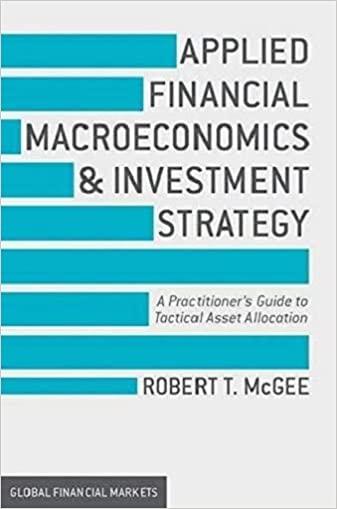Answered step by step
Verified Expert Solution
Question
1 Approved Answer
What remains to be seen, however, is whether shareholders are better or worse off with more leverage. Problem 2 does not tell us , because
What remains to be seen, however, is whether shareholders are better or worse off with more leverage. Problem does not tell us because there we computed total value of equity, and shareholders care about value per share. Ordinarily, total value will be a good proxy for what is happening to the price per share, but in the case of a relevering firm, that may not be true. Implicitly, we assumed that, as our firm in problems levered up it was repurchasing stock on the open market you will note that EBIT did not change, so management was clearly not investing the proceeds from the loans into cashgenerating assets We held EBIT constant so that we could see clearly the effect of financial changes without getting them mixed up in the effects of investments. The point is that, as the firm borrows and repurchases shares, the total value of equity may decline, but the price per share may rise.
Debt tax shields can be valued by discounting the future annual tax savings at the pretax cost of debt. For debt, that is assumed to be outstanding in perpetuity, the tax savings is the tax rate, times the interest payment, The present value of this perpetual savings is
authorized for use only in Dr Maurice Tse's PMBA Advanced Corporate Finance at The University of Hong Kong Faculty of Business & Economics frc
to Jul
Page
UV
Now, solving for the price per share may seem impossible because we are dealing with two unknownsshare price and the change in the number of shares:
Share price
But by rewriting the equation, we can put it in a form that can be solved:
Share price
Referring to the results of problem let's assume that all the new debt is equal to the cash paid to repurchase shares. Please complete the following table:
table Debt Debt Debt Equity, Equity, Equity
Total market value of equity
Cash paid out
# Original shares
Total value per share
In this set of problems, is leverage good for shareholders? Why? Is leveringunlevering the firm something that shareholders can do for themselves? In what sense should shareholders pay a premium for shares of levered companies?

Step by Step Solution
There are 3 Steps involved in it
Step: 1

Get Instant Access to Expert-Tailored Solutions
See step-by-step solutions with expert insights and AI powered tools for academic success
Step: 2

Step: 3

Ace Your Homework with AI
Get the answers you need in no time with our AI-driven, step-by-step assistance
Get Started


